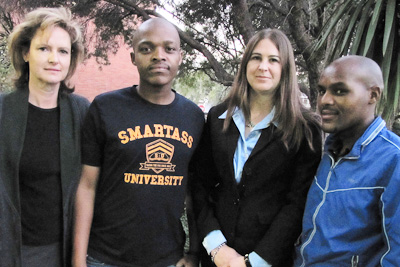Latest News Archive
Please select Category, Year, and then Month to display items
12 October 2020
|
Story Arina Engelbrecht
|
Photo Supplied
 Arina Engelbrecht from Organisational Development and Employee Well-being believes physical activity has a number of benefits for one’s health, including stress relief.
Arina Engelbrecht from Organisational Development and Employee Well-being believes physical activity has a number of benefits for one’s health, including stress relief.
Being physically active plays a big role in preventing the development of mental-health problems and in improving the quality of life of people experiencing mental-health problems.
Treatment for depression
Physical activity can be an alternative treatment for depression. It can be used as a stand-alone treatment or in combination with medication and/or psychological therapy. It promotes all kinds of changes in the brain, including neural growth, reduced inflammation, and new activity patterns are formed that promote feelings of calm and well-being. It releases endorphins – powerful chemicals in the brain that energise your spirit and make you feel good.
Physical activity can be very effective in relieving stress. Research in adults has found that physically active individuals tend to have lower stress levels compared to individuals who are less active. It also leads to improved sleep. When a person sleeps better and feels more rested, overall quality of life improves. They cope better with daily life stressors.
Reduce Alzheimer's risk
Regular physical activity can reduce your risk of developing Alzheimer's disease by up to 50%. It can also slow down further deterioration in those who have already started to develop cognitive problems. It stimulates the brain’s ability to maintain old connections as well as to make new ones.
A study asked people to rate their mood immediately after periods of physical activity (e.g. going for a walk/run, cycling, doing housework) and periods of inactivity (e.g. reading a book or watching television). Researchers found that participants felt more content, more awake, and calmer after being physically active compared to after periods of inactivity.
In conclusion, people who are physically active feel a sense of well-being, feel more energetic throughout the day, sleep better at night, have sharper memories, and feel more relaxed and positive about themselves and their lives.
“Being physically active not only changes your body, it changes your mind,
attitude, and your mood.” – Arina Engelbrecht
UFS students listen to world expert in environmental law
2010-08-05
 |
Dr Ilze Keevy, Kabelo Khara, LL.B. final-year student in Environmental Law, Adv. Antoinette Ferreira, and Luthando Tshangana, also an LL.B. final-year student in Environmental Law.
Photo: Leonie Bolleurs |
In one of her classes, Dr Ilze Keevy, Senior Lecturer in the Department of Constitutional Law and Philosophy of Law at the University of the Free State (UFS), invited Adv. Antoinette Ferreira, a Senior Prosecutor at the Special Prosecution Unit of the Director of Public Prosecution: Free State, this week to present an interesting and topical lecture about Organised Environmental Crime and Biodiversity. The lecture was, amongst others, attended by LL.B., LL.M. and LL.D. students in Environmental Law, as well as master’s students in Environmental Management.
Adv. Ferreira, who is currently working on one of the world’s most important syndicate cases about rhinoceros hunting, dealt with environmental law in her lecture, with the focus on organised crime syndicates. Issues like how syndicates operate, the prosecution of syndicates and all the problems related to the destruction of our South African biodiversity formed part of her lecture. – Leonie Bolleurs